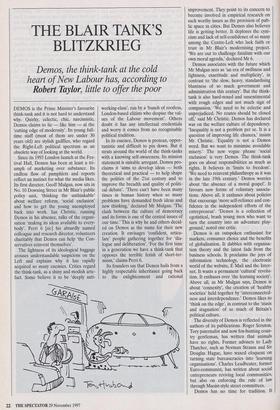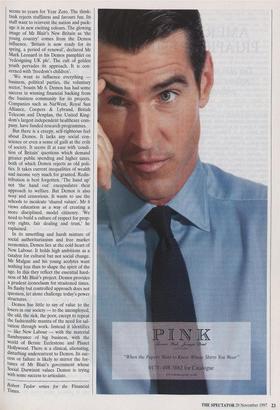THE BLAIR TANK'S BLITZKRIEG
Demos, the think-tank at the cold heart of New Labour has, according to
Robert Taylor, little to offer the poor DEMOS is the Prime Minister's favourite think-tank and it is not hard to understand why. Quirky, eclectic, chic, narcissistic, Demos claims to lie — like him — at the `cutting edge of modernity'. Its young full- time staff (most of them are under 30 years old) are stylish gadflies, who regard the Right-Left political spectrum as an obsolete way of looking at the world.
Since its 1993 London launch at the Fes- tival Hall, Demos has been at least a tri- umph of marketing over substance. Its endless flow of pamphlets and reports reflect an instinct for what the media likes. Its first director, Geoff Mulgan, now sits in No. 10 Downing Street in Mr Blair's public policy unit, 'thinking the unthinkable' about welfare reform, 'social exclusion' and how to get the young unemployed back into work. Ian Christie, running Demos in his absence, talks of the organi- sation 'making its ideas available to every- body'. Perri 6 [sic] his absurdly named colleague and research director, volunteers charitably that Demos can help 'the Con- servatives reinvent themselves'.
The lightness of its ideological baggage arouses understandable suspicions on the Left and explains why it has rapidly acquired so many enemies. Critics regard the think-tank, as a shiny and modish arte- fact. Some believe it to be 'deeply anti- working-class', run by a 'bunch of rootless, London-based elitists who despise the val- ues of the Labour movement'. Others doubt it has any intellectual credentials and worry it comes from no recognisable political tradition.
In its essence, Demos is protean, oppor- tunistic and difficult to pin down. But it struts around the world of the think-tanks with a knowing self-awareness. Its mission statement is suitable arrogant. Demos pro- claims it 'aims to develop ideas — both theoretical and practical — to help shape the politics of the 21st century and to improve the breadth and quality of politi- cal debate'. 'There can't have been many times in human history when so many problems have demanded fresh ideas and new thinking,' declared Mr Mulgan. 'The clash between the culture of democracy and its forms is one of the central issues of our time.' This is why he and others decid- ed on Demos as the name for their new creation. It envisages 'confident, articu- late' people gathering together for 'dia- logue and deliberation'. 'For the first time in a generation we have a think-tank that opposes the terrible fetish of short-ter- mism,' claims Perri 6.
Its founders say that Demos hails from a highly respectable inheritance going back to the enlightenment and rational improvement. They point to its concern to become involved in empirical research on such worthy issues as the provision of pub- lic space in cities. But Demos also believes life is getting better. It deplores the cyni- cism and lack of self-confidence of so many among the Centre-Left who lack faith or trust in Mr Blair's modernising project. `We are out to challenge fatalism with our own moral agenda,' declared Mr 6.
Demos associates with the future which Mr Mulgan sees as 'an era of swiftness and lightness, exactitude and multiplicity', in contrast to 'the slow, heavy, standardising bluntness of so much government and administration this century'. But the think- tank is also hard-nosed and unsentimental with rough edges and not much sign of compassion. 'We need to be eclectic and unprejudiced. No routes should be closed off,' said Mr Christie. Demos has declared war on the welfare culture of dependency. `Inequality is not a problem per se. It is a question of improving life chances,' insists Mr Christie. 'Equality is not a Demos word. But we want to minimise avoidable misery.' The new vogue phrase 'social exclusion' is very Demos. The think-tank goes on about responsibilities as much as rights. It believes in 'limits to freedom'. `We need to reinvent philanthropy as it was in the late 19th century.' Demos worries about 'the absence of a moral gospel'. It favours new forms of voluntary associa- tions. Above all, it enthuses about policies that encourage 'more self-reliance and con- fidence in the independent efforts of the entrepreneur'. 'Demos is a collection of egotistical, brash young men who want to turn the country into an adventure play- ground,' noted one critic.
Demos is an outspoken enthusiast for markets, consumer choice and the benefits of globalisation. It dabbles with organisa- tion theory and the latest fads from the business schools. It proclaims the joys of information technology, the electronic world of the website, E Mail and the Inter- net. It wants a permanent 'cultural' revolu- tion. It enthuses over 'the learning society'. Above all, as Mr Mulgan says, Demos is about 'connexity', the creation of 'healthy societies' held together by 'interconnected- ness and interdependence.' Demos likes to `think on the edge', in contrast to the 'stasis and stagnation' of so much of Britain's political culture.
The diversity of Demos is reflected in the authors of its publications. Roger Scruton, Tory paternalist and now fox-hunting coun- try gentleman, has written that animals have no rights. Former advisers to Lady Thatcher, such as Norman Strauss and Sir Douglas Hague, have waxed eloquent on turning state bureaucracies into 'learning organisations'. Charles Leadbeater, former Euro-communist, has written about social entrepreneurs reviving local communities, but also on enforcing the rule of law through Maoist-style street committees.
Demos has no time for tradition. It seems to yearn for Year Zero. The think- tank rejects stuffiness and favours fun. Its staff want to reinvent the nation and pack- age it in new exciting colours. The glowing Image of Mr Blair's New Britain as 'the young country' comes from the Demos influence. 'Britain is now ready for its spring, a period of renewal', declared Mr Mark Leonard in his Demos pamphlet on `redesigning UK plc'. The cult of golden youth pervades its approach. It is con- cerned with 'freedom's children'.
`We want to influence everything business, political parties, the voluntary sector,' boasts Mr 6. Demos has had some success in winning financial backing from the business community for its projects. Companies such as NatWest, Royal Sun Alliance, Coopers & Lybrand, British Telecom and Denplan, the United King- dom's largest independent healthcare com- pany, have funded research programmes.
But there is a creepy, self-righteous feel about Demos. It lacks any social con- science or even a sense of guilt at the evils of society. It seems ill at ease with 'condi- tion. of Britain' questions which demand greater public spending and higher taxes, both of which Demos rejects as old poli- tics. It takes current inequalities of wealth and income very much for granted. Redis- tribution is best forgotten. 'The hand up' not 'the hand out' encapsulates their approach to welfare. But Demos is also nosy and censorious. It wants to use the schools to inculcate 'shared values'. Mr 6 views education as a way of creating a more disciplined, model citizenry. 'We need to build a culture of respect for prop- erty rights, fair dealing and trust,' he explained.
In its unsettling and harsh mixture of social authoritarianism and free market economics, Demos lies at the cold heart of New Labour. It holds high ambitions as a Catalyst for cultural but not social change. Mr Mulgan and his young acolytes want nothing less than to shape the spirit of the age. In this they reflect the essential hard- ness of Mr Blair's project. Demos provides a prudent iconoclasm for straitened times. Its flashy but controlled approach does not question, let alone challenge today's power structures.
Demos has little to say of value to the losers in our society — to the unemployed, the old, the sick, the poor, except to repeat the fashionable mantra of the need for sal- vation through work. Instead it identifies — like New Labour — with the material flamboyance of big business, with the world of Bernie Ecclestone and Planet Hollywood. There is a clinical, alienating, disturbing undercurrent to Demos. Its suc- cess or failure is likely to mirror the for- tunes of Mr Blair's government whose Social Darwinist values Demos is trying with some success to articulate.
Robert Taylor writes for the Financial Times.



















































































 Previous page
Previous page